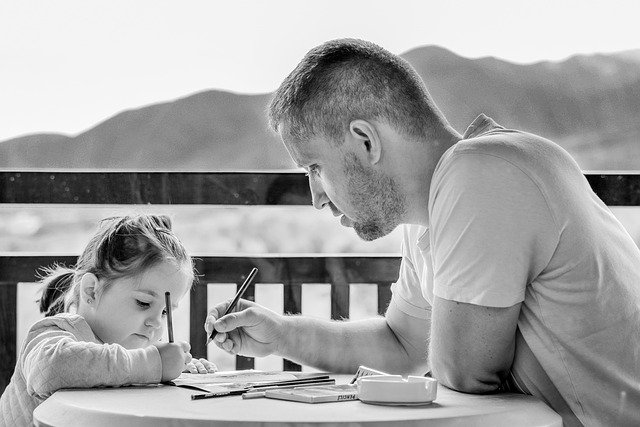In the frenzy of contemporary family life, when schedules are hectic and distractions abound, parents may feel overwhelmed and removed from the present moment. Despite the turmoil, there is a deep technique that has the potential to change the way we parent: mindful parenting.
What is Mindful Parenting?
At its core, mindful parenting is the discipline of paying complete attention and awareness to the current moment, with openness, curiosity, and nonjudgment. It entails developing a strong connection with our children, recognizing their needs, feelings, and experiences, and reacting with compassion and understanding.

Finding Balance in the midst of chaos.
In today’s fast-paced world, achieving balance might seem like an impossible task. However, mindful parenting provides a method to recover balance and present in our family life. Slowing down, focusing on the present moment, and letting go of distractions allow us to connect meaningfully with our children.
Presence in Action: The Art of Being Fully Present.
Mindful parenting isn’t about being flawless or knowing all the answers. It is about being fully present and attentive to our children, even in the middle of turmoil. Whether we’re playing with our kids, assisting them with their schoolwork, or just having a meal together, every moment is a chance to foster presence and connection.
Navigating Challenges with Compassion and Calm.
Tantrums and meltdowns, as well as sibling disputes and adolescent rebellion, are unavoidable obstacles of parenting. In these situations, mindful parenting encourages us to stop, take a deep breath, and respond with compassion and tranquility rather than fury or wrath. By demonstrating self-regulation and emotional resilience, we teach our children how to manage their own emotions and behavior.
Embracing Imperfections and Self-Compassion
Mindful parenting does not aim for perfection, but rather embraces the messiness and faults of family life. It’s about accepting our own limits, forgiving ourselves for our errors, and treating ourselves and our children with care and compassion. By practicing self-compassion, we build a loving inner environment in which we may present our best selves to our children.
The Ripple Effect: Promoting Mindful Families
As we build mindfulness in our own lives and parenting practices, we generate a ripple effect that spreads to our families and communities. By demonstrating presence, compassion, and self-awareness, we encourage our children to emulate these traits in their own lives. Together, we foster a culture of awareness and connection that benefits all family members.
Practical Strategies for Implementing Mindful Parenting
While the idea of mindful parenting is appealing, putting it into practice may be difficult at times. However, with a few practical steps, we may begin to include mindfulness into our parenting approach:
Set Intentions: Begin each day with the attentive purpose of being present and compassionate with your children. Remind yourself of the traits you wish to have as a parent, such as patience, compassion, and understanding.

Create Mindful Moments: Set aside time throughout the day to practice mindfulness with your children. This might be as easy as taking a few deep breaths together before beginning a new activity or doing a quick mindfulness practice throughout transitions like getting ready for school or sleep.
Practice Mindful Listening: When your kid talks to you, give them your entire attention. Set down your phone, establish eye contact, and listen without interrupting. Validate their sentiments and demonstrate empathy by thinking on what they’ve said.
When dealing with difficult conduct, employ a deliberate approach to disciplining. Before responding, understand the underlying emotions and needs that are motivating your child’s conduct. Instead of punishing or criticizing, respond with empathy and compassion.
Model Mindfulness: Children learn by example, so seek to demonstrate mindfulness in your own actions. Practice self-care, stress management, and emotional control strategies, and be honest about your experiences with your children. By exhibiting mindfulness in your own life, you may encourage your children to develop their own mindfulness practice.
Journey of Mindful Parenting
As you begin your mindful parenting journey, keep in mind that it is not about reaching perfection or learning a certain set of practices. It’s about building a way of being that allows you to be present, compassionate, and real for your children.
Along the road, be kind to yourself and appreciate minor wins. Mindful parenting is a technique that takes patience, effort, and self-compassion. With time and dedication, you’ll discover that mindful parenting not only improves your connection with your children, but also enhances your own life in deep and unexpected ways.
So, take a deep breath and enjoy the adventure of mindful parenting—one moment at once. With each breath, stop, and act of presence, you’ll find mindfulness’s transformational potential in the beautiful, messy, and eternally gratifying journey of parenting.
Developing Your Mindful Parenting Practice: Advanced Techniques for Greater Connection
As your mindful parenting journey progresses, there are advanced strategies and approaches that may help you connect with your children and strengthen your mindfulness practice. Let’s look at some of these techniques:
Mindful Savoring: Take time during the day to appreciate the minor delights and pleasures of parenthood. Whether it’s the warmth of an embrace, the sound of your child’s laughing, or the beauty of a shared sunset, take the time to thoroughly immerse yourself in these moments of connection and thankfulness.
Mindful Communication: Practice mindful speaking to strengthen your communication with your children. Before you speak, stop and carefully examine your words. Speak gently, honestly, and clearly, and listen with an open heart and mind.
Mindful Touch: Use touch to establish a deeper connection with your children. Whether it’s a light hand on their shoulder, a loving hug, or a fun tickle, let your touch express warmth, love, and support.
Mindful Play: When playing with your children, truly immerse yourself in the present moment. Set aside distractions and devote your whole focus to the task at hand. Allow yourself to be completely present and playful, enjoying the excitement and spontaneity of the moment.
Mindful Reflection: Set aside time at the end of each day to reflect on your parenting experiences. Take note of any moments of connection, pleasure, or progress, as well as any problems or opportunities for improvement. Approach your thoughts with inquiry and compassion, and turn them into opportunities for learning and development.
By adding these advanced strategies into your mindful parenting practice, you may strengthen your bond with your children, build deeper present and awareness, and see the transformational power of mindfulness in your family life. Remember that mindful parenting is a process, with each moment providing opportunities for development, learning, and connection. As you improve your practice, may you discover even more pleasure, contentment, and love in the wonderful experience of parenthood.
Developing Mindful Rituals: Imbuing Everyday Moments with Presence
Making mindful rituals a part of your family’s daily routine is an effective method to strengthen your mindful parenting practice. These rituals act as anchors, grounding you and your children in the present moment and encouraging connection, thankfulness, and presence. Here are a few suggestions for introducing thoughtful routines into your family life:
Morning Mindfulness: Start each day with a thoughtful time together as a family. This might include a little meditation, a deep breathing practice, or just a few minutes of stillness to establish good thoughts for the day. Use this opportunity to express thanks to each other and build a feeling of calm and presence before the day’s activities begin.

Mealtime Meditation: Make dining a thoughtful ritual by practicing appreciation beforehand. Encourage each family member to share something they’re thankful for, such as the food on their plate, the companionship of loved ones, or the simple joys of life. Take a time to absorb each mouthful, paying close attention to the tastes, textures, and feelings.
Nature Walks: Take frequent nature walks as a family to connect with the natural world and one another. Encourage your children to appreciate the sights, sounds, and fragrances of nature while fully engaging their senses in the current now. Use these treks as an opportunity for contemplation, discourse, and collaborative inquiry.
nighttime thankfulness: At the end of each day, practice a nighttime ritual focusing on thankfulness and connection. Before bedtime, meet as a family to reflect on the day’s highlights and show gratitude to one another. Share moments of pleasure, generosity, and love, and take the time to address any problems or difficulties that emerged. End the day with serenity and appreciation, knowing that you enjoyed moments of connection and presence with your children.
Mindful Breathing pauses: Take mindful breathing pauses throughout the day with your family. Take a few seconds to stop, shut your eyes, and concentrate on your breathing. Take note of the feeling of your breath traveling in and out of your body, and allow yourself to relax and center in the moment. Use these intervals to reset and refresh, cultivating a feeling of serenity and present among the chaos of everyday life.
The Complete Guide to Baby Names Trends, Meanings, and Inspiration
Incorporating thoughtful rituals into your family’s daily routine creates chances for connection, presence, and thankfulness, which enriches your life and strengthens your link with your children. These simple but effective habits serve as reminders to slow down, enjoy the present moment, and appreciate the beauty and wonder of life as it unfolds. Read more



